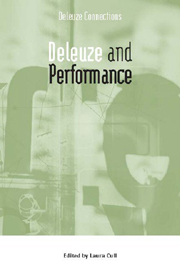Book contents
- Frontmatter
- Contents
- Introduction
- 1 Performing in the Chaosmos: Farts, Follicles, Mathematics and Delirium in Deleuze
- Act I Deleuze on Theatre: Artaud, Beckett and Carmelo Bene
- Interval
- Act II Confronting Deleuze and Live Performance
- Interval
- Act III A Digital Deleuze: Performance and New Media
- 11 Like a Prosthesis: Critical Performance à Digital Deleuze
- 12 Performance as the Distribution of Life: From Aeschylus to Chekhov to VJing via Deleuze and Guattari
- 13 The ‘Minor’ Arithmetic of Rhythm: Imagining Digital Technologies for Dance
- Notes on Contributors
- Index
12 - Performance as the Distribution of Life: From Aeschylus to Chekhov to VJing via Deleuze and Guattari
from Act III A Digital Deleuze: Performance and New Media
Published online by Cambridge University Press: 12 September 2012
- Frontmatter
- Contents
- Introduction
- 1 Performing in the Chaosmos: Farts, Follicles, Mathematics and Delirium in Deleuze
- Act I Deleuze on Theatre: Artaud, Beckett and Carmelo Bene
- Interval
- Act II Confronting Deleuze and Live Performance
- Interval
- Act III A Digital Deleuze: Performance and New Media
- 11 Like a Prosthesis: Critical Performance à Digital Deleuze
- 12 Performance as the Distribution of Life: From Aeschylus to Chekhov to VJing via Deleuze and Guattari
- 13 The ‘Minor’ Arithmetic of Rhythm: Imagining Digital Technologies for Dance
- Notes on Contributors
- Index
Summary
What terrifies me is just ordinary everyday routine, the thing none of us can escape.
(Dmitry Silin in Chekhov's ‘Terror’; quoted in Borny 2006: 21)The task of life is to make all these repetitions coexist in a space in which difference is distributed.
(Deleuze 1994: xix)… the body, this crucible of energy mutations.
(Gil 1998: 107)Performance Culture
It is still perhaps possible to underestimate the importance of performance to life as lived. In this chapter, performance will be understood as an important activity within life. Performance, even within the theatre, will not be taken as a repetition of life from a remove. Rather, performance will be taken to fit perfectly within Gilles Deleuze's description of the task of life itself. This task is to bring repetitions together onto the same immanent plane, to make ‘repetitions coexist in a space in which difference is distributed’.
Performance adds something to life's mix. A modulation of life within life is performed in order to make life liveable. Life's ‘task’, modulated in performance, becomes an acceptance and re-distribution, within life, of life's own ongoing distribution of differential intensity. It is in this that performance is close to the heart of Deleuze's philosophy as well as to life. For Deleuze's philosophy, the problematic distribution of differential intensity – always an intensity between other intensities, to infinity – is the key to ‘everything’.
- Type
- Chapter
- Information
- Deleuze and Performance , pp. 221 - 239Publisher: Edinburgh University PressPrint publication year: 2009



